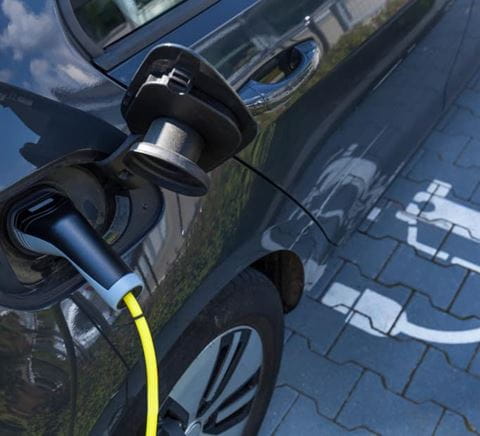
Public Charging
How fast can I charge?
Public charging stations offer significantly more charging capacity than home charging stations, which are often limited to 11 kW. Public chargers can deliver up to 200 kW, or even 400 kW for new-generation models, allowing for much faster charging of your electric vehicle. This is a huge advantage when you need to charge quickly along the way.
7.4 kW power output
- 50 kWh EV battery7h45m
- 75 kWh EV battery10 a.m.
11 kW power output
- 50 kWh EV battery5h15m
- 75 kWh EV battery6h45m
50 kW power output
- 50 kWh EV battery53 min
- 75 kWh EV battery1h20m
150 kW power output
- 50 kWh EV battery18 min
- 75 kWh EV battery27 min
How do you charge an electric vehicle?
What are the different types of EV charging? You can charge your electric vehicle at home, at work or at a public charging station.How do I charge my vehicle at home? If your home has a parking space, you can request the installation of your own charging station. If the parking lot is shared with the other residents of a residence, you will probably need to discuss its installation with the building manager, your landlord, your co-owners or other tenants. If your home doesn't include a parking space, you may be able to find a charging station nearby.How do I charge my vehicle at work? Charging your electric vehicle at work is both cheap and convenient. If your workplace doesn't have a charging station, we can help you arrange for it to be installed.Charging map
- Fast charging points
The fast charging points have fixed cables with different types of plugs, which means you don't need your own charging cable for this. Plug the charging cable into the car and into the charging point. You can easily start and stop charging with your charging card.
How much does it cost to charge in public?
The costs of charging in public depend on the operator of the charging station. Prices may include a start-up fee (one-time) and can be based on either time (per minute) or energy consumption (per kWh). Check with your employer what is allowed in terms of charging in public.
Using a fast charger is more expensive than standard public charging stations or home charging. It's good to see if the speed advantage justifies the extra cost.
Time-based charging: The operator charges you based on the amount of time your car is connected to the charging station. This means that you pay as long as you are parked at the charging station, even after charging is complete. For charging stations using this system, you might see a sign that says: "a fee applies as long as your car is connected to the charging station, even when the charging process is already stopped".
Charging per kWh: This operator charges according to the consumption in kWh in combination with the parking time at the charging station. When you have a company rental with Ayvens, the costs of charging your car are covered by your employer via Ayvens.
Find out about the good and bad uses of public chargers on our blog.

Tips for charging abroad
When travelling abroad with your electric vehicle, there are several things to consider. Will my charge card work everywhere? What infrastructure is available? How do I plan the best route? This may seem like a lot at first, but with a little planning, you'll be good to go!

